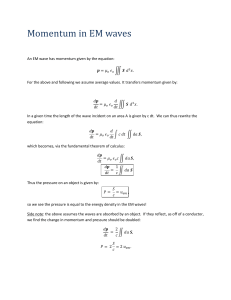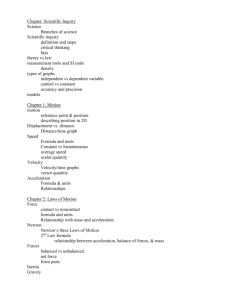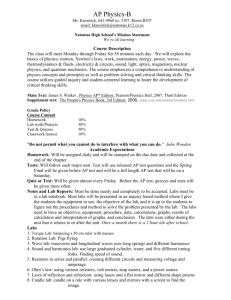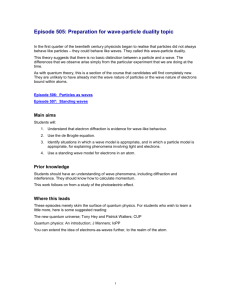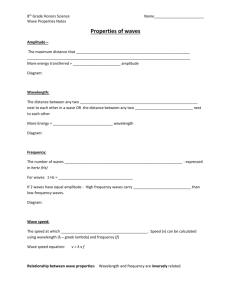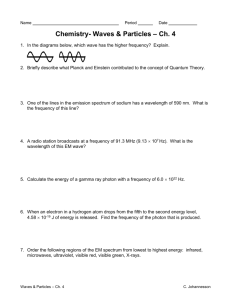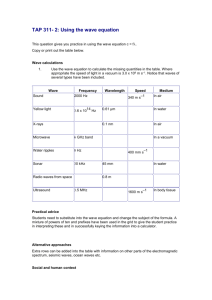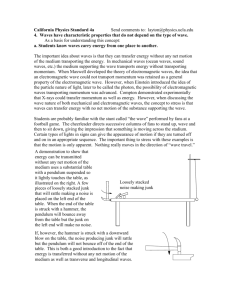Word - Physics Teacher
advertisement
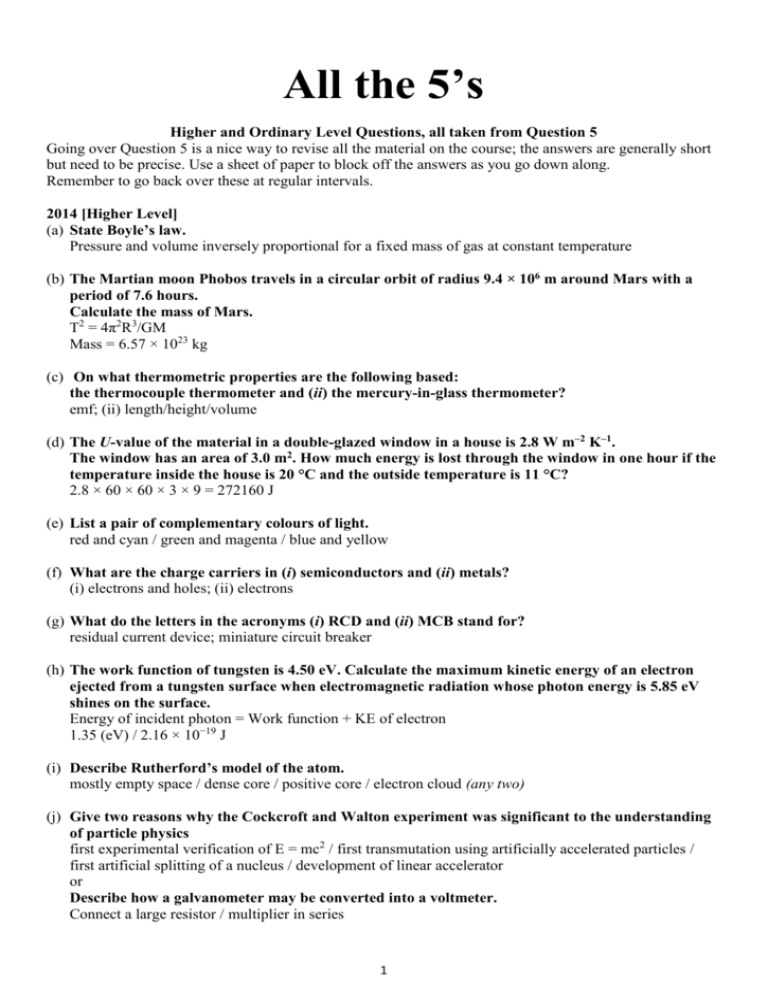
All the 5’s
Higher and Ordinary Level Questions, all taken from Question 5
Going over Question 5 is a nice way to revise all the material on the course; the answers are generally short
but need to be precise. Use a sheet of paper to block off the answers as you go down along.
Remember to go back over these at regular intervals.
2014 [Higher Level]
(a) State Boyle’s law.
Pressure and volume inversely proportional for a fixed mass of gas at constant temperature
(b) The Martian moon Phobos travels in a circular orbit of radius 9.4 × 106 m around Mars with a
period of 7.6 hours.
Calculate the mass of Mars.
T2 = 4π2R3/GM
Mass = 6.57 × 1023 kg
(c) On what thermometric properties are the following based:
the thermocouple thermometer and (ii) the mercury-in-glass thermometer?
emf; (ii) length/height/volume
(d) The U-value of the material in a double-glazed window in a house is 2.8 W m–2 K–1.
The window has an area of 3.0 m2. How much energy is lost through the window in one hour if the
temperature inside the house is 20 °C and the outside temperature is 11 °C?
2.8 × 60 × 60 × 3 × 9 = 272160 J
(e) List a pair of complementary colours of light.
red and cyan / green and magenta / blue and yellow
(f) What are the charge carriers in (i) semiconductors and (ii) metals?
(i) electrons and holes; (ii) electrons
(g) What do the letters in the acronyms (i) RCD and (ii) MCB stand for?
residual current device; miniature circuit breaker
(h) The work function of tungsten is 4.50 eV. Calculate the maximum kinetic energy of an electron
ejected from a tungsten surface when electromagnetic radiation whose photon energy is 5.85 eV
shines on the surface.
Energy of incident photon = Work function + KE of electron
1.35 (eV) / 2.16 × 10−19 J
(i) Describe Rutherford’s model of the atom.
mostly empty space / dense core / positive core / electron cloud (any two)
(j) Give two reasons why the Cockcroft and Walton experiment was significant to the understanding
of particle physics
first experimental verification of E = mc2 / first transmutation using artificially accelerated particles /
first artificial splitting of a nucleus / development of linear accelerator
or
Describe how a galvanometer may be converted into a voltmeter.
Connect a large resistor / multiplier in series
1
2014 [Ordinary Level]
(a) A crane, powered by an electric motor, has a bucket that weighs 540 N when
empty. The crane uses the bucket to lift 800 N of concrete up 75 m on a building
site. Calculate the work done by the crane’s motor.
W = F.s = (540 + 800)(75) = 1.005 × 105 N m
(b) Which of the following are vector quantities and which are scalar quantities?
Vectors: force, velocity
Scalars: mass, time
(c) Which of the following is used in the flash of a camera?
capacitor
(d) What is the Doppler effect?
apparent change in wave frequency due to motion of the wave source
(e) Name the lens shown and give an application of it.
convex / converging lens used as a magnifying glass/(eye) glasses
/binoculars/camera/etc.
(f) What is meant by the U-value of a material?
measure of the heat flow through 1 m2 of material each second (perpendicular to the direction of flow)
when a temperature difference of one degree exists between the two sides
(g) Name the component with the symbol shown in the diagram.
light dependent resistor / LDR
(h) Name a piece of laboratory equipment used to separate white light into its colours.
(glass) prism // (diffraction) grating
(i) How are X-rays produced?
(when high speed) electrons hit a metal target
(j) Calculate the energy released each second.
E = m c2 = (4× 109)(3 × 108)2 = 3.6 × 1026 J
2
2013 [Higher Level]
(a) What is the shortest stopping time for a car which is travelling at 16 m s−1 and has a maximum
deceleration of 2.5 m s−2?
v = u + at.
0 = 16 – 2.5t
t = 6.4 secs
(b) State the law of conservation of momentum.
The Principle of Conservation of Momentum states that in any collision between two objects, the total
momentum before impact equals total momentum after impact, provided no external forces act on the
system.
(c) Explain why heat does not travel through solids by means of convection.
The particles cannot move freely
(d) Storage heaters are frequently used to heat buildings. State the principle that underlies the
operation of an electrical storage heater.
Storage heaters have a large heat capacity. They are heated when electricity is inexpensive (off peak).
They then store a large quantity of energy which they release energy slowly (during the day).
(e) If a diamond has a refractive index of 2.42, what is the speed of light in the diamond?
𝑠𝑝𝑒𝑒𝑑 𝑜𝑓 𝑙𝑖𝑔ℎ𝑡 𝑖𝑛 𝑎𝑖𝑟
2.42 = 𝑠𝑝𝑒𝑒𝑑 𝑜𝑓 𝑙𝑖𝑔ℎ𝑡 𝑖𝑛 𝑑𝑖𝑎𝑚𝑜𝑛𝑑
speed of light in diamond = 1.24 × 108 m s-1
(f) Define the volt
The potential difference between two points is one volt if 1 J of work is needed to move 1 C of charge
from one point to the other
(g) A positively-charged rod is brought near to a neutral, conducting
sphere that is on top of an insulating stand, as shown in the diagram.
How would a student charge the sphere negatively by induction?
Earth the sphere, remove the earth connection and then remove the rod.
(h) Explain what is meant by the statement: “Zinc has a threshold frequency of 1.04 × 1015 Hz”.
Below this frequency electromagnetic radiation /photons will not cause emission of electrons (from the
zinc).
(i) Give one benefit of switching from fossil fuels to nuclear power for the generation of electricity.
Explain your answer.
No carbon dioxide is produced in nuclear power generation because ???
(j) Give an expression for the minimum frequency of a photon that can form an electron and a
positron by pair production.
2𝑚𝑐 2
𝑓=
ℎ
2013 [Ordinary Level]
(a) Give an example of (i) a vector quantity, (ii) a scalar quantity.
Vector: Velocity, acceleration, force etc
Scalar: Time, mass, speed etc
(b) The spanner shown in the diagram is used to turn a nut.
Calculate the moment of the force applied by the spanner
to the nut.
50 × 0.1 = 5 N m
3
(c) Which of the following scientists is associated with the discovery of the structure of the atom?
Einstein Rutherford Faraday Coulomb
Rutherford
(d) What is meant by the threshold of hearing?
The threshold of hearing is the smallest sound intensity detectable by the average human ear at a frequency of
one thousand Hertz.
(e) How does light travel through an optical fibre?
By total internal reflection
(f) Give a common use for a convex lens.
Magnification, (eye) glasses, binoculars, contact lenses, camera, etc.
(g) What colour is the wire that is connected to the fuse in a standard three-pin plug?
Brown
(h) Give a common use for a capacitor.
Store charge / conducts a.c. /(radio) tuning / filtering / smoothing / timing / store energy / flash camera /
phone charger, etc.
(i) What is the photoelectric effect?
The Photoelectric Effect is the emission of electrons from a metal due to electromagnetic radiation of a
suitable frequency falling upon it.
(j) Name one method for detecting radioactive particles.
Geiger-Muller tube, Geiger counter, solid state detector, cloud chamber, bubble chamber, GLE,
photographic film, radioactive sensor, etc.
4
2012 [Higher Level]
(a) Cork and Sligo are about 330 km apart by road.
Using the map of Ireland shown on page 4, estimate the displacement of Sligo
from Cork.
The scale of the map is 1 cm to 37.5 km. {or at least it was before I reduced it}
Displacement = (290 ± 3) km, north
(b) A pendulum moves with simple harmonic motion.
Give another example of a body that moves with simple harmonic motion.
A mass oscillating on a spring
(c) The European aerospace group EADS is developing a hypersonic jet aircraft that will fly at four
times the speed of sound, 330 m s-1. Express the speed of the aircraft in kilometres per hour.
4752 km h–1
(d) What is the focal length of a lens which has a power of -2 m-1?
P = 1/f
f = (–) 0.50 m = (–)50 cm
(e) List three conditions necessary for an observer to see a rainbow.
Observer’s back to sun / (bright) sunlight /(suspended) droplets of water /proper angle of viewing, etc.
(f) How is energy transferred from the sun to the earth?
(by means of) radiation / photons / electromagnetic waves
(g) A person smokes a cigarette at the entrance to a building. Explain how a significant amount of the
smoke from the cigarette can enter the building.
(reference to) convection currents / diffusion / wind assisted / pressure variations, etc.
(h) Sketch the magnetic field due to a current in a solenoid.
Uniform field inside solenoid / divergent field outside
(i) It takes 30 minutes for a 100 g sample of a radioactive isotope to decay to 12.5 g.
What is the half-life of the radioisotope?
100 g to 50 g is one half-life,
50 g to 25 g is a second half-life,
25 g – 12.5 g is a third half-life.
30 mins = 3 half-lives. Half-life = 10 mins.
(j) Which Irish physicist is associated with the development of the linear accelerator?
Walton
5
2012 [Ordinary Level]
(a) A tow-truck pulls a car with a net horizontal force of 500 N.
Calculate the work done in towing the car a distance of 2 km to a garage.
W = Fs = (500)(2000) =106 J
(b) Give one factor on which the potential energy of a body depends.
Mass, acceleration due to gravity, height
(c) Which one of the following instruments is used to measure atmospheric pressure?
hydrometer barometer thermometer joulemeter
Answer: barometer
(d) The Tacoma Narrows Bridge collapsed, soon after construction, due to resonance.
What is resonance?
Resonance is the transfer of energy which results in an object vibrating at its natural frequency.
(e) A building has a low U-value. What is the advantage of this?
Low energy loss
(f) Why is a lightning conductor made of copper?
Good conductor and doesn’t corrode
(g) Why does a magnet that is free to rotate point north?
Because of the earth’s magnetic field.
(h) What is the principle of operation of a transformer?
A change in magnetic flux induces an emf.
(i) The photo shows an LDR. Draw the electrical circuit symbol for an LDR.
See diagram
(j) What is the main source of energy in the sun?
Nuclear fusion (or hydrogen)
6
2011 [Higher Level]
(a) A car of mass 1500 kg is travelling at a constant velocity of 20 m s–1.
What force is required to stop it in a distance of 50 m?
v2 = u2 + 2as
0 = (20)2 + 2(a)(50)
a = 4 m s-2
F = ma
F = 1500a
F = 6000 N
(b) Why does the value of g, the acceleration due to gravity, vary at different locations on the surface
on the earth?
Locations are at different distances from the earth’s centre / earth is not perfectly spherical / etc.
(c) Why is a convex mirror used, instead of a plane mirror, as a door mirror on a car?
A convex mirror offers a wider field of view
(d) What causes the Doppler effect?
The Doppler Effect is the apparent change in the frequency of a wave due to the relative motion between
the source of the wave and the observer.
(e) The capacitance of a parallel plate air capacitor is 5 pF.
If the plates of the capacitor are 2 cm apart, what is the common area of the plates?
Take εair = ε0.
𝐶=
𝜀𝐴
𝑑
𝐴=
(5×10−12 )(2×10−2 )
A = 0.0113 m2
8.854×10−12
(f) A residual current device (RCD) as shown is rated 30 mA.
Explain the significance of this rating.
RCD trips if more than 30 mA flows to earth
(g) The physicist Robert Millikan is usually associated with what physical quantity?
The charge on an electron
(h) What property of light controls the current in a photocell?
(light) intensity/ brightness
(i) What is the role of neutrons in a nuclear reactor?
To cause (nuclear) fission / to initiate reaction / any valid answer
(j) Give the difference between the quark composition of a baryon and of a meson.
Baryon: 3 quarks, meson: quark and antiquark
or
Give two ways of reducing energy loss in a transformer.
Laminate the core, wire of lower resistance, reduce hysteresis, reduce magnetic flux leakage, etc.
7
2011 [Ordinary Level]
a) What is friction?
Friction is a force which opposes the relative motion between two obects.
b) What is the relationship between G, the gravitational constant and g, the acceleration due to
gravity?
GM
g 2
d
c) A crowbar is an example of a lever. Give another example of a lever.
door handle, scissors, wheelbarrow, tongs etc
d) Which of the following terms is associated with a wave motion?
half-life interference induction
doping
Answer: Interference
e) Name the three ways by which heat can travel from one place to another
conduction, convection, radiation
f) Give two uses of a concave mirror
headlights, makeup, shaving mirrors, etc
g) What is the colour of the earth cable in a standard 3-pin plug?
yellow & green
h) How does a miniature circuit breaker (MCB) improve safety in a domestic circuit?
It breaks the circuit when the current gets too high.
i) Give a use for an electroscope.
Test for charge, identify charge, measure potential
j) Give a disadvantage of a named renewable source of energy.
biomass/ tide /sun / wind is not always there
8
2010 [Higher Level]
a) What are the two conditions for the equilibrium of a set of co-planar forces?
Forces up = forces down // (algebraic) sum of forces acting is zero
(Algebraic) sum of the moments (of the forces about any point) is zero
b) What is the critical angle of a sample of glass whose refractive index is 1.46?
n = 1/sin c
Sin c = 43.2o
c) Name the parts labelled A and B of the spectrometer shown in
the diagram.
A = (turn)table, B = telescope
d) Explain why snow is slow to melt as the day-time temperatures rises above 0 °C.
Latent heat of snow/ice (energy needed for change of state) is (very) large
e) What is the positive charge stored on a 5 μF capacitor when connected to 120 V d.c. supply?
Q = CV = (5 × 10–6)(120)
Q = 6.0 × 10–4 C
f) Which of the following devices is adjusted when tuning into a radio station?
Transformer, diode, capacitor, rheostat
Capacitor
g) State Faraday’s law of electromagnetic induction.
Faraday’s Law states that the size of the induced emf is proportional to the rate of change of flux.
h) The peak voltage of an a.c. supply is 300 V. Calculate its rms voltage.
Vrms = 300/2 = 212(V)
i) Name the naturally occurring radioactive gas which seeps into buildings from underground rocks
and which can cause lung cancer.
Radon (gas)
j) Give two advantages of a circular accelerator over a linear accelerator.
Smaller (less space) // greater speeds/energy
9
2010 [Ordinary Level]
a) State Boyle’s law
For a fixed mass of gas kept at a constant temperature) the pressure is inversely proportional to the
volume
b) A concrete mixer delivered 50 m3 of concrete to a building site, what was the mass of the concrete
delivered? (density of concrete = 2400 kg m−3)
Density = mass/volume
mass = density × volume
mass = 2400 × 50 = 120000 kg
c) State Archimedes’ Principle
When a body is immersed in a fluid/liquid it experiences an upthrust equal in size to the weight of the
fluid displaced.
d) Which of these scientists is associated with the law of refraction of light?
Rutherford Snell Joule Einstein
Snell
e) If the temperature of an object is 28 0C, what is its temperature in Kelvin?
273.15 + 28 = 301.15 K
f) Give one difference between a light wave and a sound wave
Light waves travel faster than sound waves, light travels in transverse waves, sound in longitudinal
waves
g) Sketch the magnetic field surrounding a bar magnet
See diagram
h) Give a common use of capacitors?
Store charge, tune radio, flash guns, smoothing, filtering.
i) In relation to semiconductors, what is meant by the term doping?
Doping is the addition of a small amount of atoms of another element to a pure semiconductor to
increase its conductivity.
j) What type of nuclear reaction occurs in a nuclear power station?
Fission.
10
2009 [Higher Level]
a) State Boyle’s law.
For a fixed mass of gas at constant temperature, pressure is inversely proportional to volume.
b) The moon orbits the earth.
What is the relationship between the period of the moon and the radius of its orbit?
The period squared is proportional to the radius cubed
c) Why is it necessary to have a standard thermometer?
Two different types of thermometer will give slightly different readings at the same temperature.
d) The sound intensity level at a concert increases from 85 dB to 94 dB when the concert begins.
By what factor has the sound intensity increased?
If sound intensity doubles intensity level increases by 3 dB, so if intensity has increased by 9 dB then
the sound intensity must have increased by a factor of 8.
e) Draw a ray diagram to show the formation of an image
in a convex mirror.
See diagram
f) Define electric field strength.
Electric field strength is defined as force per unit charge.
g) When will an RCD (residual current device) disconnect a circuit?
When the magnitude of the current flowing in is different from that flowing out.
h) What is the average emf induced in a coil of 20 turns when the magnetic flux cutting it decreases
from 2.3 Wb to 1.4 Wb in 0.4 s?
E= N (dφ / dt) = (20)[(2.3 – 1.4)/0.4]
E = 45 V
i) How are X-rays produced?
Accelerated (fast moving) electrons strike a (heavy) metal (target) causing electrons in the target to rise
to a high orbital level. When these electrons fall back down to a lower lever they emit they energy as Xrays.
j) Arrange the fundamental forces of nature in increasing order of strength.
Gravitational, weak, electromagnetic, strong.
11
2009 [Ordinary Level]
(a) State the principle of conservation of momentum.
The Principle of Conservation of Momentum states that in any collision between two objects, the total
momentum before impact equals total momentum after impact, provided no external forces act on the
system.
(b) A man opens a door by applying a force of 5 N to the door.
The distance from the point of application of the force to the fulcrum is 120 cm.
Calculate the moment of the applied force.
M = 5 × 1.2 = 6 N m
(c) Which of the following is the unit of energy; kilogram, watt, joule, ampere?
Answer: joule
(d) Calculate the wavelength of a radio wave whose frequency is 252 kHz. (c = 3.0 × 108 m s−1 )
c=fλ
λ = c /f
λ = (3.0 × 108)÷ (252 × 103) = 1.19 × 103 m
(e) Draw a diagram to show the path of a ray of light travelling through an optical fibre.
(f) Name the property on which the pitch of a musical note depends.
Frequency
(g) Name the instrument shown in the diagram.
A gold leaf electroscope
(h) What are isotopes?
Atoms which have the same atomic number but different mass number.
(i) Give one application of the photoelectric effect.
Burglar alarms, automatic doors, control of burners in central heating, sound track in films, etc
(j) List two properties of X-rays.
Electromagnetic waves, have short wavelength, cause ionisation , penetrate materials, no mass, no
charge, effect photographic film, etc.
12
2008 [Higher Level]
a) State the law of flotation.
When a body floats in a liquid its weight is equals the weight of fluid displaced.
b) The head of a thumbtack has an area of 500 mm2. Its point has an area of 0.3 mm2. The pressure
exerted at the head of the thumbtack is 12 Pa. What is the pressure exerted at the point of the
thumbtack?
(at head:) F = P × A
F = 12(500 × 10-6)
F = 6.0 × 10-3 N
(this force is now the same for all points on the thumbtack)
(at point:) P = F/A = (6.0 × 10-3) / 0.3 × 10-6) = 2.0 × 104 Pa
c) What is the relationship between the frequency of a vibrating stretched string and its length?
Frequency is proportional 1/ length
d) Why does diffraction not occur when light passes through a window?
The window is too wide (relative to wavelength of light).
e) Why is a fluorescent tube an efficient source of light?
Most of the (electrical) energy is converted to light (energy)
f) What is the force exerted on an electron when it is in an electric field of strength 5 N C–1?
E = F/q
F = Eq
F = 5(1.6 × 10–19)
F = 8.0 × 10–19 N
g) What are the charge carriers when an electric current
(i) passes through a semiconductor; (ii) passes through an electrolyte?
(i)
electrons and (positive) holes (ii) ions
h) Give two ways of deflecting a beam of electrons.
By means of an electric field and a magnetic field.
i) Name an instrument used to detect radioactivity.
What is the principle of operation of this instrument?
A Geiger-Muller tube. Ionisation.
j) The existence of the neutrino was proposed in 1930 but it was not detected until 1956. Give two
reasons why it is difficult to detect a neutrino.
No charge and very small mass.
13
2008 [Ordinary Level]
(a) State the principle of conservation of momentum.
The principle of conservation of momentum states that in any collision between two objects, the total
momentum before impact equals total momentum after impact, provided no external forces act on the
system.
(b) A solid block in the shape of a cube of length 120 cm rests on a table.
The weight of the block is 25 N. Calculate the pressure it exerts on the
table.
P = F/A P = 25 ÷ (1.2)2
P = 17.4 pa
(c) Which of the following is the unit of energy?
Kelvin
watt
newton
joule
Answer: joule
(d) What physical quantity is measured in decibels?
Sound intensity.
(e) A concave lens has a power of 0.1 cm−1. What is the focal length of the lens?
10 cm
(f) Give one effect of static electricity?
Lightning, static discharge, receive shock after walking across carpets, attracts objects, can damage
electronics.
(g) Give two uses for the instrument shown.
It can function as a voltmeter, ammeter, ohmmeter or thermometer.
(h) What is the colour of the live wire in an electric cable?
Brown
(i) State two properties of X-rays.
Electromagnetic waves, have short wavelength, cause ionisation, penetrate materials, no mass and no
charge.
(j) What is nuclear fusion?
Nuclear Fusion is the combining of two small nuclei to form one large nucleus with the release of
energy.
14
2007 [Higher Level]
(a) State Archimedes’ principle.
When an object is immersed in a fluid, the upthrust it experiences is equal to the weight of the displaced
fluid.
(b) Why is a filament light bulb not an efficient source of light?
Almost all of the energy is given off as heat.
(c) Why does the temperature of an athlete reduce when she perspires?
As the water evaporates it takes heat energy from the body.
(d) How is infra-red radiation detected?
Temperature sensor / photographic film.
(e) The refractive index of a liquid is 1.35, what is the critical angle of the liquid?
0
ng =1/ sin c
(f) Calculate the energy stored in a 5 μF capacitor when a potential difference of 20 V is applied to it.
E = ½ CV2 = ½ (5 x 10-6)(20)2 = 1.0 x 10-3 J
(g) Why does a magnet that is free to rotate point towards the North?
It is the south end of the magnet which is being attracted to the north of the Earth’s magnetic field.
(h) State the principle on which the definition of the ampere is based.
A current-carrying conductor in a magnetic field experiences a force.
(i) How are electrons accelerated in a cathode ray tube?
By a large potential difference.
(j) A kaon consists of a strange quark and an up anti-quark. What type of hadron is a kaon?
It is a meson.
15
2007 [Ordinary Level]
(a) State Newton’s second law of motion.
The rate of change of momentum is directly proportional to the applied force.
(b) Which of the following is not a renewable source of energy:
wind, nuclear, solar, hydroelectric?
Nuclear
(c) The temperature of a body is 34 °C. What is its temperature in kelvin?
273 + 34 = 307 K
(d) Name two methods by which heat can be transferred.
Conduction, convection, radiation.
(e) The diagram shows parallel rays of light approaching a concave mirror.
Copy the diagram and show the paths of the rays after they strike the
mirror.
(f) Give one application of the Doppler effect.
Red shift of stars / speed detection.
(g) Name two safety devices that are used in domestic electric circuits.
Fuse, (trip) switch, miniature circuit breaker / MCB, residual current device / RCD, earthing,bonding,
etc.
(h) Name the electrical component represented in the diagram.
LDR / light dependant resistor
(i) Draw a sketch of the magnetic field around a bar magnet.
(j) The half life of a radioactive element is 3 days.
What fraction of a sample of the radioactive element will remain after 9 days?
After 3 days (one half-life) ½ would remain,
after 6 days (two half –lives) ¼ would remain,
after 9 days (three half-lives) ⅛ would remain.
16
2006 [Higher Level]
(a) State Newton’s third law of motion.
Newton’s First Law of Motion states that every object will remain in a state of rest or travelling with a
constant velocity unless an external force acts on it.
(b) Why is it easier to turn a nut using a longer spanner than a shorter one?
The distance from the fulcrum is greater therefore there is a greater turning effect.
(c) The average value for the solar constant in Ireland is 1.2 × 102 W m–2. What is the average energy
falling normally on an area of 5 m2 of ground in Ireland in 1 minute?
Energy per minute on 5 m2 = (1.2 x 102)(5)(60) = 36,000 J or 3.60 x 104 J
(d) A sound wave is diffracted as it passes through a doorway but a light wave is not. Explain why.
The wavelength is approximately the same as the width of the door whereas the wavelength of light is
much less.
(e) What is the Doppler effect?
The Doppler Effect is the apparent change in the frequency of a wave due to the relative motion between
the source of the wave and the observer.
(f) An RCD is rated 30 mA. Explain the significance of this current.
The RCD trips the circuit at 30 mA or greater .
(g) Why is Coulomb’s law an example of the inverse square law?
Because force is inversely proportional to distance squared.
(h) Sketch a graph to show the variation of current with potential difference
for a semiconductor diode in forward bias.
See diagram
(i) Describe the Bohr model of the atom.
A dense positively-charged nucleus with the negatively-charged electrons in orbit at discrete levels
around it.
(j) Name the three negatively charged leptons.
Electron, muon, tau
17
2006 [Ordinary Level]
a) A person pushed a car a distance of 15 m with a force of 500 N. Calculate the work done by the
person.
Work = Force × distance = 500 × 15 = 7,500 J.
b) Which one of the following instruments can be used to measured the density of a liquid?
barometer
hydrometer
thermometer
Answer: hydrometer
c) What is friction?
Friction is a force which opposes the relative motion between two objects.
d) Give one example of a thermometric property.
Resistance / emf / voltage / colour / volume / length / pressure, etc.
e) Copy and complete in your answerbook the following diagram to show how a
concave mirror forms an image of an object O, which is placed outside the
focus F of the mirror.
f) Give one use of a spectrometer.
Measure wavelength of light / demonstrate spectra / chemical analysis, etc.
g) Name the electrical component represented in the diagram.
Variable resistor / rheostat
h) State Ohm’s law.
Ohm’s Law states that the current flowing through a conductor is directly proportional to the potential
difference across it, assuming constant temperature.
i) Give one use of a capacitor.
Store charge / (radio) tuning / smoothing / store energy / flash camera, etc.
j) Give two properties of the electron.
Small mass, negative charge, orbits the nucleus, deflected by electric / magnetic fields, etc.
18
2005 [Higher Level]
(a) A container contains 5.0 kg of water. If the area of the base of the container is 0.5 m2. Calculate the
pressure at the base of the container due to the water. (acceleration due to gravity = 9.8 m s–2)
P = F/A = [(5.0)(9.8)/(0.5)]
P = 98 Pa
(b) State Boyle’s law.
Pressure is inversely proportional to volume for a fixed mass of gas at constant temperature
(c) What is the thermometric property of a thermocouple?
emf
(d) An object O is placed 30 cm in front of a concave mirror of focal length 10 cm. How far from the
mirror is the image formed?
1/u + 1/v = 1/f
1/30 + 1/v = 1/10
v = 15 cm = 0.15 m
(e) A capacitor of capacitance 100 μF is charged to a potential difference of 20 V. What is the energy
stored in the capacitor?
E = ½CV2
E = ½(100 × 10-6)(20)2
E = ½(100)(20)2 = 0.02 J
(f) Draw a sketch of the magnetic field due to a long
straight current-carrying conductor.
See diagram
(g) A pear-shaped conductor is placed on an insulated stand as shown.
Copy the diagram and show how the charge is distributed over the conductor
when it is positively charged.
Place charges on the conductor but ensure that they are more concentrated at the
pointed end.
(h) Explain why high voltages are used in the transmission of electrical energy.
High voltages result in smaller currents therefore less energy is lost as heat.
(i) How are electrons produced in an X-ray tube?
Thermionic emission occurs at the heated cathode.
(j) Name the fundamental force of nature that holds the nucleus together.
The strong nuclear force.
19
2005 [Ordinary Level]
a) State the principle of conservation of momentum.
In any collision between two objects, the total momentum before impact equals total momentum after
impact, provided no external forces act on the system.
b) A car accelerates from 10 m s−1 to 30 m s−1 in 5 seconds. What is its acceleration?
v = u + at a = ( v – u ) ÷ t
a = (30 – 10) ÷ 5 a = 4 m s-2.
c) Which one of the following is the unit of power?
joule
kelvin
kilogram
watt
Answer: watt
d) Name two methods by which heat can be transferred.
Conduction, convection, radiation.
e) A wave motion has a frequency of 5 hz and a wavelength of 200 m. Calculate the speed of the
wave.
c=fλ
c = 5 × 200 = 1000 m s-1.
f) Infrared radiation is part of the electromagnetic spectrum.
Name two other radiations that are part of the electromagnetic spectrum.
Radio waves, microwaves, infrared, (visible) light, ultraviolet, gamma rays, X-rays.
g) Name the electrical component represented in the diagram.
A diode.
h) List two safety devices that are used in domestic electric circuits.
Fuse, miniature circuit breaker, residual current device, earthing, bonding.
i) What is the photoelectric effect?
It is the emission of electrons from a metal due to light of a suitable frequency falling upon it.
j) Name a material used as shielding in a nuclear reactor.
Lead, concrete.
20
2004 [Higher Level]
(a) Two forces are applied to a body, as shown. What is the magnitude of the
resultant force acting on the body?
R2 = F12 + F22
R2 = 52 +122
R = 13 N
The marking scheme didn’t look for direction, but it should have, particularly since
this is a vectors question and force is a vector. = tan-1 (5/12).
(b) A can of height 10 cm is submerged in water.
What is the difference in pressure between the top and bottom of the can?
P = ρgh
P = (1000)(9.8)(0.1) = 980 Pa
(c) Explain the term thermometric property.
A thermometric property is a property that changes measurably with temperature.
(d) The sound intensity doubles as a person approaches a loudspeaker. What is the increase in the
sound intensity level?
3 dB
(e) Two converging lenses, each with a focal length of 10 cm, are placed in contact. What is the power
of the lens combination?
P = 1/f = 10 m−1
P = P1 + P2 = 20 m-1
(f) What is meant by polarisation of waves?
A polarized wave is one which vibrates in one plane only.
(g) Identify two hazards caused by static electricity.
Electric shock / explosion in flour mills /explosion when fuelling aircraft/ damage to electronic devices /
electrical storm / static cling, etc.
(h) The activity of a radioactive isotope decays to 1/16th of its original value after 36 years.
What is the half-life of the isotope?
1- ½ = 1 half-life.
½ - ¼ = a second half-life.
¼ - 1/8th = a third half-life.
1/8th – 1/16th = a fourth half-life.
36 years = 4 half-lives. Half-life = 9 years
21
2004 [Ordinary Level]
a) A student holds a metal ball 2 m above the ground. The mass of the ball is 5 kg.
Calculate the potential energy of the ball.
Ep = mgh = 5 × 9.8 × 2 = 98 J.
b) Explain the term thermometric property.
A thermometric property is a property that changes measurably with temperature.
c) Give one application of the Doppler effect.
Speed gun, measuring red shift, ultrasonic scanners, used to study blood flow, used to study heart beat,
etc.
d) Name two primary colours of light.
Red, blue, green
e) Which one of the following is not part of the electromagnetic spectrum?
sound waves
microwaves ultraviolet
radiation
Answer: sound
f) Name the electrical component represented in the diagram.
A capacitor
g) Name two safety devices that are used in domestic electric circuits.
Fuse, miniature circuit breaker, residual current device / RCD, earthing, etc.
h) A conductor of length 50 cm is carrying a current of 5 A.
It is placed at right angles to a magnetic field of flux density 3 T.
Calculate the force on the conductor.
F = B I l F = 3 × 5 × 0.5 = 7.5 N
i) Which one of the following is emitted from a metal surface when suitable light shines on the
metal?
protons neutrons
electrons
atoms
Electrons
j) What is nuclear fission?
Nuclear Fission is the break-up of a large nucleus into two smaller nuclei with the release of energy (and
neutrons).
22
2003 [Higher Level]
(a) State Hooke’s law.
Hooke’s Law states that when an object is stretched the restoring force is directly proportional to the
displacement provided the elastic limit is not exceeded.
(b) What is the relationship between the acceleration due to gravity g and the distance from the centre
of the earth?
g is proportional to 1/d2
(c) The diagram shows forces of 5 N applied to a water tap.
Calculate the moment of the couple (torque) on the tap.
Moment = force × distance = 0.3 N m
(d) Which wave phenomenon can be used to distinguish between transverse
waves and longitudinal waves?
Polarisation
(e) Sound intensity level can be measured in dB or dB(A).
What is the difference between the two scales?
The dB(A) is adjusted so that it is suitable for the human ear.
(f) Calculate the critical angle for diamond. The refractive index of diamond is 2.4.
n = 1/ sin c
c = 24.60
(g) What is the purpose of a miniature circuit breaker (MCB) in an electric circuit?
It behaves as a fuse when too large a current flows
(h) What is the photoelectric effect?
It is the emission of electrons from the surface of a hot metal due to radiation of a suitable frequency
shining on it.
(i) What is meant by nuclear fusion?
Nuclear fusion is the combining of two small nuclei to form one large nucleus with the release of energy.
(j) Give one contribution made to Physics by either Paul Dirac or Nicholas Callan.
Dirac predicted antimatter.
23
2003 [Ordinary Level]
(a) What is the momentum of an object with a mass of 5 kg travelling at 10 m s-1?
Momentum = mass × velocity = 5 × 10 = 50 kg m s-1.
(b) State Boyle’s law.
For a fixed mass of gas, pressure is inversely proportional to volume, assuming temperature is constant.
(c) Name a renewable source of energy.
Solar, wind, tidal, hydro, biomass
(d) The temperature of a body is 300 K. What is its temperature in degrees Celsius?
300 – 273 = 27 0C.
(e) Name two methods by which heat can be transferred.
Conduction, convection and radiation.
(f) Give one difference between light waves and sound waves.
Light waves are transverse; sound waves are longitudinal
Light waves can be polarised; sound waves cannot be polarised
Light waves travel through vacuum; sound waves cannot travel through
(g) Describe the image that is formed in a concave mirror when an object is placed
inside the focus, as shown in the diagram.
The image is virtual, magnified and upright.
(h) State one energy conversion that takes place in an electrical generator.
Kinetic to electric
(i) What is a transformer used for?
To increase or decrease voltage.
(j) Give two properties of the electron.
Small mass, negative charge, orbits the nucleus.
24
2002 [Higher Level]
a) A particle travels at a constant speed of 10 m s-1 in a circle of radius 2 m. What is its angular
velocity?
v = r
= v/r = 10/2
= 5 rad s-1
b) Give the equation that defines temperature on the Celsius scale.
T (0C) = T(K) - 273
c) The solar constant is 1.35 kW m-1. What is the average amount of energy falling normally on each
square metre of the earth’s atmosphere in one year? (one year = 3.16 × 10 7s)
Solar constant by time = (1.35 × 103)(3.16 × 107) =
4.27 ×1010 J
d) What is the Doppler effect?
The Doppler Effect is the apparent change in the frequency of a wave due to the relative motion between
the source of the wave and the observer.
e) Define sound intensity.
Sound Intensity is defined as power per unit area.
f) A diffraction grating has 200 lines per mm. What is the value of d in the diffraction grating
formula nλ = d sin θ ?
d = 1/200000 = 5 × 10-6 m.
g) How much energy is stored in a 100 μF capacitor when it is charged to a potential difference of 12
V?
E = ½ CV2 = ½ (100 × 10-6)(12)2 = 7.2 × 10-3 J
h) What is the purpose of a residual current device (RCD) in an electrical circuit?
It acts as a safety device by breaking the circuit if there is a difference between the live and the neutral in
a circuit.
i) A current-carrying conductor experiences a force when placed in a magnetic field. Name two
factors that affect the magnitude of the force.
Magnetic flux density, current and length.
j) What is meant by nuclear fission?
Nuclear Fission is the break-up of a large nucleus into two smaller nuclei with the release of energy (and
neutrons).
25
2002 [Ordinary Level]
(a) What is friction?
Friction is a force which opposes the relative motion between two objects.
(b) A car of mass 800 kg is travelling at 10 m s-1. What is its kinetic energy?
Ek = ½mv2
E = ½ 800 × 102
(c) In the following table, match the scientist in the first column with the law in the second column.
A. Michael Faraday
B. Isaac Newton
C. Willebrord Snell
A - 2, B - 3, C - 1
1. Law of refraction
2. Law of electromagnetic induction
3. Law of gravitation
(d) What is the effect of increasing the U-value of a structure?
It means that the heat conductivity of the structure is increased.
(e) What physical quantity is measured in decibels?
Sound intensity level
(f) A lens has a power of +50 m-1. What type of lens is it and what is its focal length?
P = 1/f
f = 1/P
f = .02 m. It is a converging (convex) lens.
(g) What is meant by a thermometric property?
A Thermometric Property is any physical property that changes measurably with temperature.
(h) Give an example of the Doppler Effect.
The pitch of moving sound source changes as it goes past.
(i) What is the purpose of a miniature circuit breaker (MCB) in an
electrical circuit?
To prevent current overload.
(j) A pear-shaped conductor is placed on an insulated stand as shown.
The conductor is given a positive charge.
Copy the diagram and show how the charge is distributed over the conductor.
26
